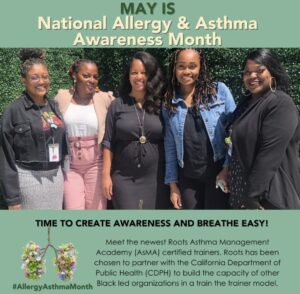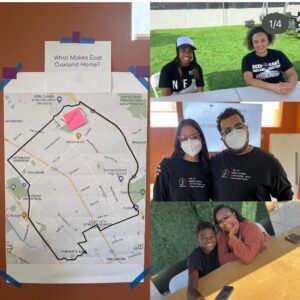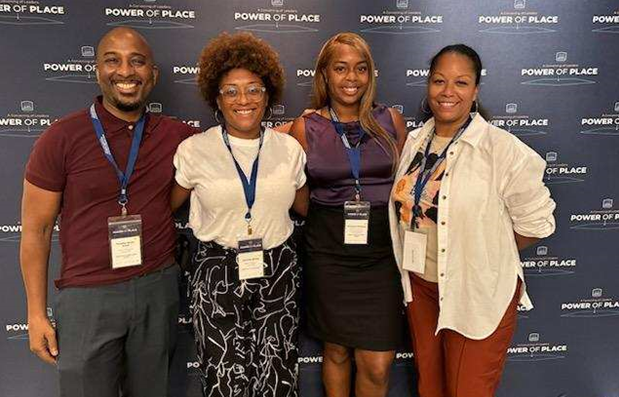Hello,
My name is Amanda Brown, Senior Program Manager at Roots Community Health Center in Oakland, CA. The mission of Roots Community Health Center is to uplift those impacted by systemic inequities and poverty. We accomplish this through medical and behavioral health care, health navigation, workforce enterprises, housing, outreach, and advocacy. In the heart of East Oakland, there is a roughly 40 x 40 block area (from Seminary Ave to the Oakland-San Leandro border, from MacArthur Blvd. to the Bay) that has experienced decades of disinvestment and is home to over 30,000 people of African descent. As a result of the impacts COVID-19, racism, gentrification, and gun violence have had on our communities, we have grounded and rooted ourselves in the areas of health, culture, community, and belonging for generations to come. Roots Community Health Center’s place-based strategies are:
- Confront the legacy of historical racism, discrimination, and wealth-stripping that deprived Oakland’s Black residents, particularly Black East Oakland residents.
- Participate in strategic planning with funders, committees, and partners.
- Implement programming that provides access to good health, housing security, quality education, economic opportunity, safety, peace, and dignity.
As a middle-class Black woman living in Oakland, California, I am honored to be a part of the Roots family and actively working to improve the health and wellbeing of the Black Community. This work is essential to me because of my close familial ties to the area. I’ve had several loved ones live in East Oakland over the years; my grandmother currently resides in the 40×40. Growing up, I watched the area change and deteriorate while residents did all they could to fight and advocate for change. Witnessing the establishment of community safety groups and resident councils, I was able to see firsthand the issues being faced in our neighborhoods. It was clear to me that things were moving in a direction that was not serving my community. I’m excited to be working in an area where I can directly serve not only my residential community but also my family’s.

I was excited by the prospect of becoming one of PHI’s Inaugural Together Toward Equity Fellows. I saw the Fellowship as an opportunity to support my leadership development and the work Roots does: advocating for economic and community development. I felt motivated to apply in hopes of gaining new skills and relationships to support our place-based strategies.
Once accepted into the fellowship, having the opportunity to reflect and have discourse around the public health issues within Oakland opened my eyes to our current landscape. These discussions left me with lingering questions like:
How did we get here?
Why are the formerly thriving Black communities of East Oakland currently suffering?
East Oakland
In the late 1960s and early 1970s, East Oakland was home to a thriving Black middle-class community. Fast forward to 2023, East Oakland’s Black community has declined due to an array of major factors including gentrification, rising property prices, and displacement. There has been an influx of residents from various racial and ethnic backgrounds. Immigration patterns have also influenced demographic changes in East Oakland, with new immigrant communities contributing to the area’s diversity. Economic opportunities elsewhere and the decline of industries that once provided stable employment have also contributed to demographic shifts. These changes have resulted in the displacement of many longtime residents and the transformation of the cultural and social fabric of these neighborhoods-including within the 40×40. Black children growing up in East Oakland used to feel safe and connected to their neighbors. They felt grounded in and proud of their cultural identity and hopeful about their future. Present day, differing cultural dynamics have created tension, between the Black community and the immigrant community, as well as competition for resources.
Black neighborhoods in East Oakland have undergone significant changes over the years, largely due to urban development, economic shifts, and demographic transformations. Additionally, government policies, such as urban renewal projects and highway construction, have reshaped the landscape in Oakland. In 1990, 163,526 Black residents lived in Oakland, accounting for 44% of the city’s population. By 2020, the Black population was only 21% citywide and numbered just 93,820, with the expectation of a continued exodus. Today, just over 9,000 Black families live in East Oakland and if current displacement trends continue, more than 2,600 Black families will be pushed out or leave East Oakland by 2030. These changes had a significant impact on health equity within the Black community. Gentrification and displacement often disrupt social networks, access to healthcare services, and neighborhood resources like grocery stores offering healthy food options. This has led to increased stress, poor mental health outcomes, and reduced access to essential healthcare services, contributing to major health disparities within the community. Loss of affordable housing and increasing housing costs have forced residents to live in substandard conditions, exacerbating health risks such as exposure to environmental hazards or inadequate sanitation. Riding to the next city over with my grandfather just to acquire healthy foods or receive healthcare always baffled me. I always wondered why some folks were able to get what they needed within walking distance while we had to travel for necessities. Seeing the direct impact on my loved ones has fueled my passion for health equity.

My Commitment to the Work
I firmly believe that we can, and must, be the catalysts for change, breaking down barriers and building pathways to a more equitable future. At the heart of my commitment to this work is the understanding that equity is not a one-size-fits-all solution but rather a complex journey that demands diverse strategies. Through the support of Fellowship discussions and hands-on activities, I’ve come to the conclusion that a multifaceted approach is needed to prioritize equitable development, community engagement, and policy interventions. Prioritizing community engagement and empowerment through participatory planning processes, grassroots organizing, and capacity-building initiatives to ensure that residents have a voice in shaping the future of their neighborhoods.
First and foremost, I believe policies need to be implemented to preserve existing affordable housing, create new affordable housing units, and protect residents from displacement through measures like rent control and tenant protection. Policies must be implemented to promote inclusive development that considers the needs and preferences of existing residents, prioritizing access to healthcare, transportation, green spaces, and other essential amenities. City leaders must implement policies to mitigate displacement, such as inclusionary zoning, community land trusts, and eviction protections to ensure that longtime residents can remain in their neighborhoods. Another key strategy would be to direct resources towards community-led initiatives, including small business support, job training programs, and healthcare services to bolster economic opportunities and social infrastructure within the Black community.
Additionally, enhancing access to culturally centered healthcare services, mental health support, and preventative care programs tailored to the needs of the Black community is vital. Increasing awareness of health disparities and advocating for policy changes at the local, state, and federal levels to address systemic inequities and promote health equity is an ongoing priority for myself and Roots Community Health Center. By implementing these strategies in a coordinated and collaborative manner, policymakers, community organizations, and residents can work together to address the changes in East Oakland’s Black neighborhoods and support the health and well-being of the Black community.
Participating in this fellowship has provided me with a wealth of experiences and connections that have strengthened my understanding of equity within the world of public health. As we further explore the importance of equity, I look forward to expanding my knowledge and applying it to my daily work. The leadership development and relationship building I’ve gained will continue to support my efforts of working alongside community leaders to create positive change for Oakland. Our work won’t stop until we’ve created an East Oakland where Black children and families not only survive, but flourish. Creating a vibrant and inclusive community where individuals can reach their full potential and contribute to the greater good.
Endnotes
P.2 US Census, 1990 & 2000
American Community Survey, 5-yr files, 2020

